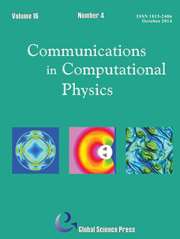Article contents
On Stochastic Error and Computational Efficiency of the Markov Chain Monte Carlo Method
Published online by Cambridge University Press: 03 June 2015
Abstract
In Markov Chain Monte Carlo (MCMC) simulations, thermal equilibria quantities are estimated by ensemble average over a sample set containing a large number of correlated samples. These samples are selected in accordance with the probability distribution function, known from the partition function of equilibrium state. As the stochastic error of the simulation results is significant, it is desirable to understand the variance of the estimation by ensemble average, which depends on the sample size (i.e., the total number of samples in the set) and the sampling interval (i.e., cycle number between two consecutive samples). Although large sample sizes reduce the variance, they increase the computational cost of the simulation. For a given CPU time, the sample size can be reduced greatly by increasing the sampling interval, while having the corresponding increase in variance be negligible if the original sampling interval is very small. In this work, we report a few general rules that relate the variance with the sample size and the sampling interval. These results are observed and confirmed numerically. These variance rules are derived for the MCMC method but are also valid for the correlated samples obtained using other Monte Carlo methods. The main contribution of this work includes the theoretical proof of these numerical observations and the set of assumptions that lead to them.
Keywords
- Type
- Research Article
- Information
- Copyright
- Copyright © Global Science Press Limited 2014
References
- 1
- Cited by


